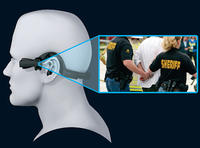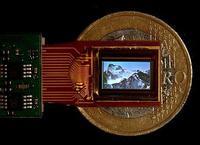-
Company develops telephone line “fingerprint” detector
Researchers at Pindrop, a new security company, have developed technology that can read telephone line “fingerprints” to prevent fraud and identify a caller
-
-
New radiation sensor developed
Scientists have created one of the most advanced radiation sensors in the world: an X-ray detector that can reveal the composition of materials in a fraction of a second
-
-
ISC West to feature 125 security startups
On 28 March, more than 125 new security companies will make their debut at the ISC West security conference in Las Vegas
-
-
Google's new privacy policy
“On its best day, with every ounce of technology the U.S. government could muster, it could not know a fraction as much about any of us as Google does now.”
Shelly Palmer, technology analyst -
-
Taser rolls out redesigned wearable cameras

Last week Taser, the manufacturers of the electric stun guns, unveiled its newly remodeled wearable camera system which is sleeker and more advanced than its predecessor; the Axon Flex, introduced less than a year after the company rolled out its first wearable cameras, represents a significant upgrade
-
-
U.S. Navy tests electromagnetic railgun launcher

The electromagnetic railgun launcher is a long-range weapon that fires projectiles using electricity instead of chemical propellants; magnetic fields created by high electrical currents accelerate a sliding metal conductor, or armature, between two rails to launch projectiles at 4,500 mph to 5,600 mph; the new railgun will allow the U.S. Navy to conduct precise, long-range naval surface fire support for land strikes, ship self-defense against cruise and ballistic missiles, and surface warfare to deter enemy vessels
-
-
Startup developing eye blood vessel biometrics
Smartphone users could soon be using the whites of their eyes as their passwords. EyeVerify, a Kansas City-based startup, has developed eye biometrics that use a smartphone’s camera to analyze a user’s blood vessels around their irises
-
-
Universal Detection developing smartphone radiation scanner for food
In the wake of Japan’s nuclear disaster at the Fukushima Daiichi atomic energy plant, concerns over contaminated food supplies have swept the nation, sparking Universal Detection Technology to develop a smartphone radiation detector specifically designed for comestibles
-
-
SOUTHCOM deploys radar that sees through foliage, rain, darkness, and dust storms
Lockheed Martin’s TRACER is a light weight, low-frequency synthetic-aperture radar that can peer through foliage, rain, darkness, dust storms, or atmospheric haze to provide real-time, high-quality tactical ground imagery; U.S. Southern Command has just deployed the penetrating radar to support the Command’s counter-terrorism and humanitarian assistance missions, and disaster relief operations
-
-
Demand for Israeli security solutions remains strong -- and is growing
Homeland Security NewsWire’s executive editor Eugene K. Chow recently spoke with Koby Tanzer, a partner at Indigo Strategic Partners, an investment firm that specializes in the Israeli security and defense sector; in the interview, Tanzer discusses Indigo’s investment philosophy, how the global recession has affected defense and homeland security spending, trends in the global homeland security market, mobile device-based security solutions, and more
-
-
Raytheon unveils new law enforcement tech center
Last week Raytheon opened the doors for the first time to its new state of the art law enforcement technology center in Downey, California
-
-
Food safety business plan competition
Two Michigan-based organizations announce a business plan competition for ventures in the food safety area; entrepreneurs with new food safety business concepts will compete for $10,000 prize
-
-
Advanced forensic tool for the battlefield
A forensic tool could soon make the analysis of evidence faster and more accurate, giving military investigators an advantage in the wars against drugs and terror
-
-
Accenture develops crime management system for Norway
Accenture is developing a new national crime management system for the Norwegian National Police Directorate (POD) to support police investigations and criminal prosecutions in Norway; the crime management system will enable the Norwegian police force to manage, link, and analyze case information and intelligence for more reliability and consistency across law enforcement, police investigations, border management, emergency response, and case administration
-
-
Compact helmet-display for first responders

Engineers at Physical Optics Corp. are working with DHS’ Science and Technology Directorate (S&T) to develop a helmet-mounted micro display system for first responders designed to improve their situational awareness
-
- All
- Regional
- Water
- Biometrics
- Borders/Immig
- Business
- Cybersecurity
- Detection
- Disasters
- Government
- Infrastructure
- International
- Public health
- Public Safety
- Communication interoperabillity
- Emergency services
- Emergency medical services
- Fire
- First response
- IEDs
- Law Enforcement
- Law Enforcement Technology
- Military technology
- Nonlethal weapons
- Nuclear weapons
- Personal protection equipment
- Police
- Notification /alert systems
- Situational awareness
- Weapons systems
- Sci-Tech
- Sector Reports
- Surveillance
- Transportation
Advertising & Marketing: advertise@newswirepubs.com
Editorial: editor@newswirepubs.com
General: info@newswirepubs.com
2010-2011 © News Wire Publications, LLC News Wire Publications, LLC
220 Old Country Road | Suite 200 | Mineola | New York | 11501
Permissions and Policies
Editorial: editor@newswirepubs.com
General: info@newswirepubs.com
2010-2011 © News Wire Publications, LLC News Wire Publications, LLC
220 Old Country Road | Suite 200 | Mineola | New York | 11501
Permissions and Policies
